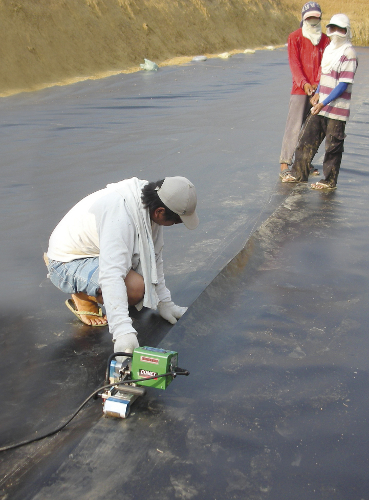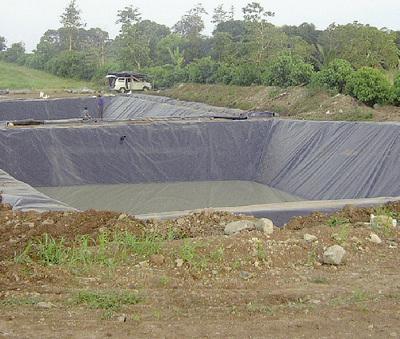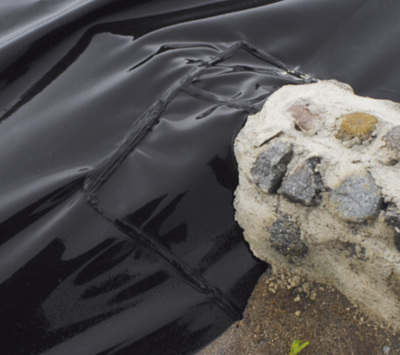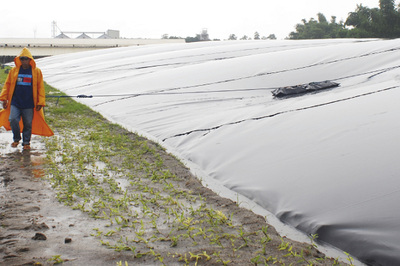|
The hole in the ozone layer that is growing ever larger, and the global warming that accompanies it, are both consequences of the rise in greenhouse gases. The Kyoto Protocol of 1997 has regulated their emission. But the targets set have not been achieved thus far. Climate change is being caused, particularly in the industrialized countries, by the combustion of fossil fuels. Agriculture is also making its own contribution worldwide. Here the main cause, alongside the forest clearances, is the intensive management of livestock. The slurry and manure of farm animals produce a vast quantity of methane (CH4). Click image to enlarge. Recognizing the signs of the times
The pig breeding industry in the Philippines has recognized the impact of climate change and global warming. It has put together a programme to raise awareness accordingly. Its objective is to make a contribution to the reduction of greenhouse gases. Normally the pig slurry is stored in open cesspools. But the breeding operations in the Philippines are now investing in covered fermentation plants. In the case of pig slurry the proportion of methane gas in the biogas thus extracted is 60 – 65 %. Leister is contributing to environmental protection Recently a first methane gas extraction plant has been put into operation – others are following. Here combustible methane is now being extracted from the fermented biomass to drive a gas turbine in a 100-kVA power station. The energy extracted from this process is sufficient to supply the whole operation with electricity, including the cooling tunnels for the pigsties for 1500 pigs. To obtain a totally sealed system, the plastic sealing film selected is 2mm thick polyethylene (HDPE). A 1 mm thick material is used for the covering over the slurry. A variety of items of Leister equipment are in use The typical dimensions of a fermentation tank for an operation of this size are 100 x 40 x 6 metres. Leister’s COMET automatic welder was used for the overlap welding of the plastic sealing sheets. It was able to scale even the steep slopes at the edge of the fermentation tanks without difficulty. The weld seam is closed by the COMET using a hot wedge with a maximum jointing force of up to 1000 N. With the option of changing the hot wedge, various types of materials can be worked with these small and easy to use automatic machines. Material thicknesses of up to 3 mm can be welded without any problems. The COMET has already proved itself worldwide a thousand times in a very wide variety of storage site and tunnel applications. Thanks to its corrosion resistance it operates without any problems even in climatically challenging regions with high air humidity, as in this case – and even in prolonged use. Hand extruder for the joints For extrusion welding on the joints and for detail tasks, Leister’s FUSION 3C was used. This compact and manageable hand extruder discharges up to 3.5 kg of extrudate per hour and is very simple to operate. The two-sided, non-twisting wire feed and a welding shoe that can be rotated through 360° make for pleasant working conditions. Professional pig breeders are convinced At the start it was difficult for the pig breeders to opt for such a plant. Firstly they had to be convinced not only that these plants provided a valuable contribution to environmental protection, but also that investment in them would pay off in the long term. The demands placed on them were considerable: alongside the investments that had to be made they also had to learn to use the Leister equipment. Here they received lots of support from Leister’s sales and service partner in the Philippines, KIV Marketing Co. The use of these fermentation plants is now beyond debate. Support in all matters The KIV Marketing Co is now introducing the experience they have gained in engineering for renewable energy sources to other customers – with success. Their comprehensive consultation services are very much in demand. They work with the customer through and beyond the planning and building phases. They put together the profitability analysis for the customer and advise the latter on the choice of materials. Not least they guarantee that thanks to their proximity they can provide help very quickly in the event of an unexpected defect in any item of equipment. Comments are closed.
|
|
STANMECH Technologies Inc.
944 Zelco Drive Burlington ON L7L 4Y3 | 1-888-438-6324 | [email protected] Terms of Use Privacy Terms and Conditions of Sale Warranty Policy |
|
Proud Member of:





